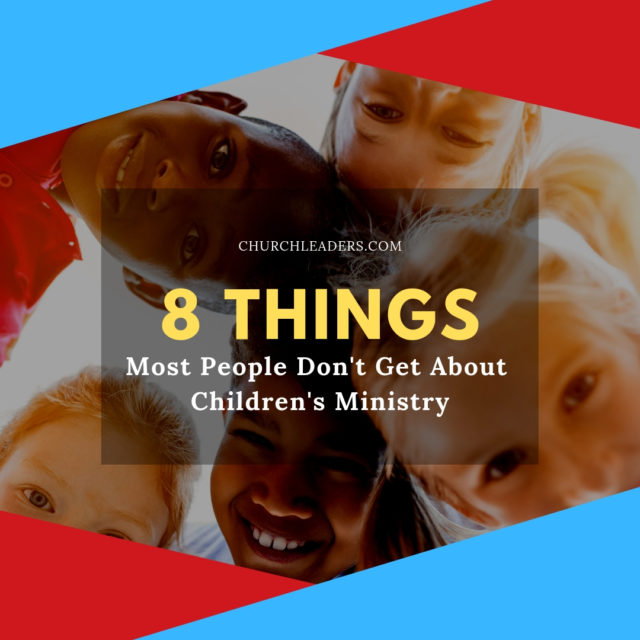Children’s ministry workers will resonate with these eight statements of what people don’t understand about this field. I’m not writing this for us insiders. It’s for people who aren’t serving in kidmin. If we can help them see how important children’s ministry is, our churches and ministries will benefit and be more effective.
What People Don’t Get About Children’s Ministry
1. Children’s ministry is just as much about adults as it is kids.
Without adults serving in children’s ministry, there is no children’s ministry. In kidmin, leading adults is just as important as leading kids. Our success rises and falls on the strength of the volunteer team we build and shepherd. Most people looking in from the outside don’t know this.
Children’s ministry leaders are some of the best in the church. They are one of the few groups who minister to all ages: children, youth who serve, adults who serve, and parents. Being able to do this takes serious leadership skills.
Each week, kidmin leaders shepherd all these different age groups. They often pray with volunteers just as much as they pray with the kids. They often invest spiritually in adult volunteers as much as they invest in kids. In addition, they often counsel parents. They make hospital visits, conduct funerals, and officiate weddings. They truly are pastors.
2. Children’s ministry is the best place to invest your time and resources.
About 85% of people who come to Christ do so before age 18. That alone makes it clear where the greatest mission field is. Churches that build great worship centers, coffee shops or adult space but neglect the children’s ministry space make a serious mistake. Spending big-budget money on adult ministry but skimping on the kidmin budget limits their impact. Churches with a large worship staff but an understaffed children’s ministry won’t reach as many families.
When you invest in children’s ministry, you’ll see fruit now and for years to come. It’s also easier to build kids than to repair adults. When you welcome kids into your church and make them a priority, you’re ushering in the blessings of Jesus. He made this clear in Matthew 18: “If you welcome a child in my name, you are welcoming Me.”
D.L. Moody started his ministry by reaching kids in inner-city Chicago. Later, as his ministry grew, he “graduated” out of kids ministry into being a pastor and evangelist. Near the end of his ministry, he said, “If I could relive my life, I would devote my entire ministry to reaching children.”
Moody got it. He understood that the best investment you can make is reaching children. Many people use children’s ministry as a “stepping stone” to an adult ministry role. I’m not saying God doesn’t move people and direct them to different ministries. But I am thankful for people whom God calls to serve their entire life in children’s ministry.
3. Running a children’s ministry requires lots of volunteers.
A children’s ministry leader once told me, “I just wish people outside of children’s ministry understood how much work it takes to have volunteers in place each week.” She wasn’t complaining. She was simply saying that most people don’t realize how much work is required to enlist, equip, and encourage a team.
This is especially true in early childhood, where you need very low ratios of volunteers to kids. Volunteers don’t just magically appear in the classrooms.
4. Nursery and preschool ministry aren’t childcare.
How many times have you heard people refer to nursery and preschool ministry as childcare? If only they knew it’s so much more. The pathway of children is largely determined by their preschool years, and a child’s view of God is formed early. In the preschool years, the foundation is laid for spiritual formation. Children absorb more information in their first three years than during any other time.
One study showed that you can predict a person’s career success as early as kindergarten. Children who did well as kindergartners were far more likely to earn a college degree and have a full-time job by age 25. Those who assessed poorly in kindergarten had a much higher chance of getting arrested, binge drinking, and not doing well financially as an adult.
The results confirm that helping kids develop life skills in early childhood is critical for their future. From an early age, this can determine if the child goes to prison or college and whether they end up employed or addicted.
We must lay the foundation of God and His Word in the hearts of children in their early years. It prepares children to step across the line of faith when they get older. As we teach preschoolers that God loves them and Jesus wants to be their best friend, we plant seeds. And those grow into saving faith when they are older.


